By Raymond Douglas Chong, AsAmNews Staff Writer
After the California Gold Rush began in 1848, thousands of Cantonese sojourners from Sye Yup region at Kwangtung province in China tirelessly mined for gold. They later built the First Transcontinental Railroad from California through Nevada to Utah. Anti-Chinese sentiment by Whites cruelly prevailed across the wildlands of the American West.
Historical Novel
Ed Shew has written a historical novel – Chinese Brothers, American Sons. He tells the story of the brave two fictional Cantonese brothers, Li Chang, the eldest, and Li Yu under the backdrop of Chinese American history.
In 1854, the Li brothers arrive at Port of San Francisco in search of riches on Gold Mountain. Li Yu left a pregnant wife at their peasant village. They mined gold in the swift river fields. They ran a Chinese restaurant at San Francisco Chinatown. With a group of men dubbed the Army of Canton, they built the First Transcontinental Railroad through the granite rock of the Sierra Nevada, across the High Desert, until the Day of the Golden Spike, May 10, 1869.
During their sojourn, the Li brothers endured the ugly poison of White racism. Li Yu fell in love with Wang Wei, a prostitute. She was a victim of human trafficking. Li Yu confidentially matured on Gold Mountain. The historical novel weaves in Chinese cuisine and Confucius beliefs.
LATEST STORIES
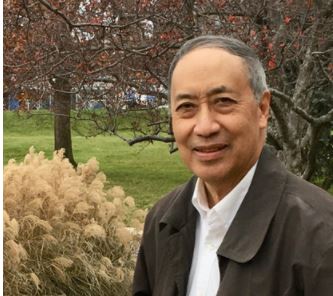
Author
Ed Shew was born in 1949 at Saint Louis, Missouri. Quai Hew Shew, his father, arrived in 1928 at the Port of San Francisco. He was a “paper son,” an illegal immigrant, from Toishan. Ganlan Nina Yee, his mother, was raised at a Chinese hand laundry in Chinatown, aka Hop Alley. His father was a waiter at the Orient Restaurant, a Chop Suey house in downtown St. Louis. He was raised in midtown with his one brother and three sisters. Before his retirement, Ed worked in Human Resources Manager with Saint Louis Community College.
Interview with Ed Shew
RAYMOND DOUGLAS CHONG: Please explain your passion to pursue the history of Transcontinental Railroad?
ED SHEW: The two coasts were now welded together. Before the Transcontinental Railroad, trekking across the country took four to six months and cost about $1,000. On the Transcontinental Railroad it took six days and cost $150. Intracontinental trade was transformed. Just as the railroad opened the markets of the west coast and Asia to the east coast of America, it brought products of eastern industry to the growing population west of the Mississippi River. A production boom ensued as the railroad transported the vast resources of the middle and west of the continent for use elsewhere. The Transcontinental Railroad was America’s first technology corridor.
RAYMOND DOUGLAS CHONG: During your research of the Army of Canton, what were your important findings?
ED SHEW: While reading about Chinese history in the United States, I unexpectedly discovered that no first-hand account describing the life of a Chinese railroad worker of the Transcontinental Railroad has ever been found. Historians have searched the winding road back to China, to the roots of these forgotten, invisible men. Many were literate, yet not a scrap of their writing remains. Now, I had a creative impulse.
With this book and its (fictional) account (using facts from Chinese American history), I hope to help people understand the racism and the demonization that the Chinese went through. They endured all the hardships and struggles when searching for gold and clawing their way across the Sierra Nevada when building the railroad.
While not America’s finest moment in the treatment of the Chinese, it was a defining moment in American history. This Transcontinental Railroad laid the foundation for the extraordinary economic prosperity enjoyed by the United States in the years that followed.
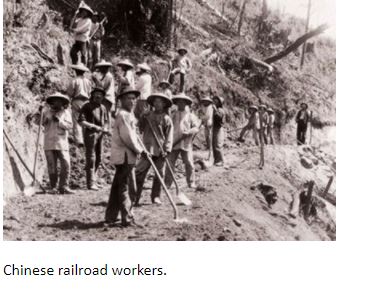
The sacrifices of the Chinese railroad workers helped to link this country together in a way that has allowed generations of Americans to dream of even greater achievements and lay down their own tracks toward the future.
RAYMOND DOUGLAS CHONG: Why did you share the Chinese women experience amid a broken bachelor society?
ED SHEW: Li Chang and Li Yu knew they had come to a country with very few Chinese women, but they found it to be a land with few women of any race. Because tradition generally kept married women at home in China, caring for their children and their in-laws, and because single women did not travel alone, Chinatown was a largely bachelor society.
The Li brothers escaped from the realities of their conditions in correspondence with home, in community with fellow Chinese miners, at a gambling table, a smoke of opium, in a bottle of whiskey or the temptations of the flesh on Saturday night.
Li Yu was introduced to human trafficking. He has an agonized encounter with Wang Wei(fictional), again, at an auction block upon arriving in San Francisco. Except for those “fortunate” women, the rest of the Chinese girls ended up in brothels of various grades, according to their attractiveness. During the typical four-year servitude, slave girls had to work for their owners without wages. These lower-grade prostitutes tended to attract White and Chinese customers, due to their comparatively low fees of 25 cents to 50 cents. The living conditions were miserable. Most of them lived in the street-level apartments. Their daily activities were restricted to these tiny rooms, usually four by six feet, and with a door that held the barred window facing a dim alley.
RAYMOND DOUGLAS CHONG: What is the romantic arc between Li Yu and Wang Wei that began at first sight in 1854 to their reunion in 1869?
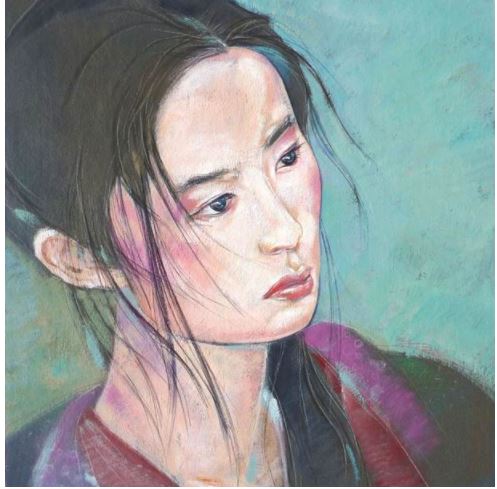
ED SHEW: “The Moon Represents My Heart is often cited as, “one of the most famous and beloved Chinese songs of all time.”
The role of the moon in Chinese culture is similar to that of the sun in Western culture, in terms of its importance and value. Throughout the novel, I use the moon to link Li Yu to Wang Wei. Initially, there was no love interest in my earlier version of this book.
Li Yu first saw Wang Wei on the ship coming over from China. He immediately felt “weak.” Li Yu saw Wang Wei on a “platform of surrender” on his first day arriving in San Francisco. But Li Yu was already married, an arranged marriage, that tied him to China and his ancestors, as he and his older brother Li Chang set out for the riches of California.
RAYMOND DOUGLAS CHONG: Please share your thinking about the recurrent theme of Chinese cuisine.
ED SHEW: I also wanted to showcase the importance of food, because few other cultures are as food oriented as the Chinese, my family included. In addition, Confucius attached great importance to food and described it as one of the three basic conditions, along with an army and trust, for founding a state.
While Li Chang was not mining, he was cooking for some of the White gold miners. In China, cooking was not deemed a woman’s job. Li Chang had the knowledge, skill, patience, and experience to cook.
But more than all of that, the gold miners had to eat. He dreamed of one day opening his own restaurant in San Francisco, Li Chang bemoaned the fact that, “I guess I’ll have to tailor my menu to please the taste buds of unadventurous American diners suspicious of foreign and unusual foods.”
RAYMOND DOUGLAS CHONG: Why did you emphasize Confucian beliefs?
ED SHEW: A main Confucian belief is “that what you do not wish to choose for yourself, never impose it on someone else.”
A man of humanity is one who,
in seeking to establish himself,
finds a foothold for others and who,
in desiring attaining himself,
helps others to attain.
Confucius (551–479 BC), Chinese philosopher
This parable by Confucius, a recurrent theme in the book, still hangs by my personal computer. It has been a guiding force, as I have worked on this book since July 2011. I have been cognizant of not trying to be too “preachy.” However, I wanted to emphasize that while gold mining life “was not easy for the Li brothers walking through this land of broken dreams. Every day heartaches grew stronger.”
RAYMOND DOUGLAS CHONG: Please clarify the massacre at Hell on Wheels Newtown in late 1868, as fact or fiction?
ED SHEW: The massacre at Hell on Wheels Newtown is fiction. I used an account of the Rock Springs Massacre at Wyoming Territory. I transplanted this act of violence during the construction of the Transcontinental Railroad.
RAYMOND DOUGLAS CHONG: As Li Chang was dying, what is the meaning of the name change for Li Yu to Li Kin-Kwok?
ED SHEW: “America is our country, your country now,” Li Chang said to Li Yu. “Therefore, I wish to give you a new name, Li Kin-Kwok, which means ‘build the country.’ This is what you have accomplished. Remember always that we built this nation’s railroads. This country broke the boy in you, but it could not break the man that you have become.”
This name change reveals how Li Yu has evolved from a scared, unsure boy to the confident, inspirational Li Kin-Kwok which means “build this country.”
RAYMOND DOUGLAS CHONG: What are lessons learned about racism and injustice for Chinese Americans?
ED SHEW: I get it. Every group that has immigrated to America has struggled to “fit in” while battling the hatred and discrimination from those already established.
For example, I do not know of one Asian who is not wounded when asked, “Where are you from? Your English is so good.” The questioners “Do not get it.” We are not the “perpetual foreigner.”
First, there was the “Yellow Peril” and later xenophobic myths that promoted the false ideas that Asians were disease carriers, a threat to the nation and could never truly become American. Now, history repeats itself with the mantra of President Donald Trump, calling Covid-19 the “Chinese Virus” and the “Kung Flu.” Since the pandemic, there are over 3,000 reported “hate crime” attacks against Asians in the United States.
Close
At Saint Louis, in a poignant muse, Ed Shew, the author, closed:
I personally acknowledge feeling angry, fearful and a bit unsettled. But I am also somewhat sad.
The ongoing xenophobiC attacks and political rhetoric have served as a reminder that, Asian Americans may never fully be able to shake the feeling that we are “Perpetual Foreigners.”
Some things never change.
AsAmNews has Asian America in its heart. We’re an all-volunteer effort of dedicated staff and interns. Check out our new Instagram account. Go to our Twitter feed and Facebook page for more content. Please consider interning, joining our staff, or submitting a story.

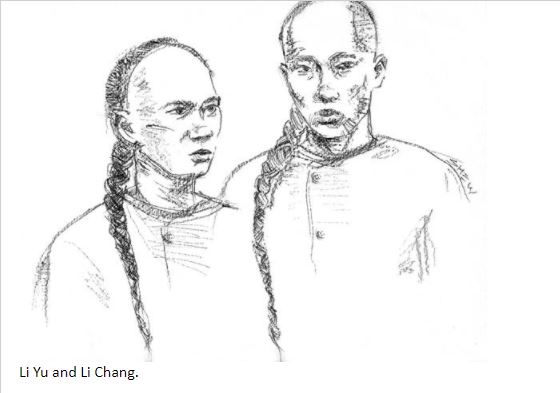



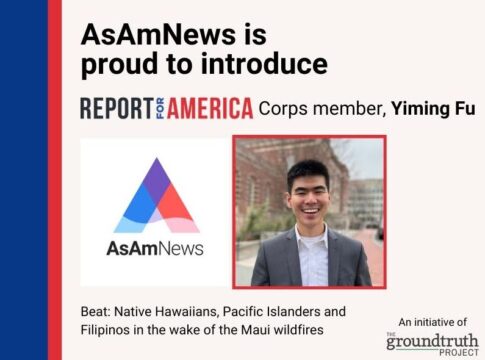
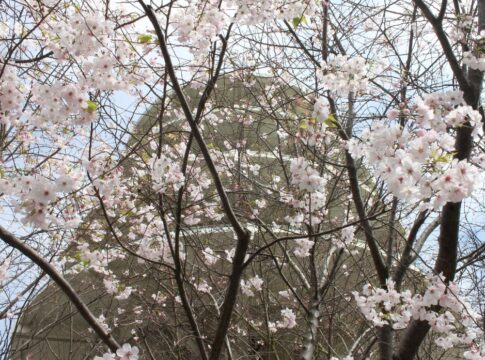


Interesting historical recount of two Chinese brothers. I like the info on the Wyoming massacre.
I’m Nona Mock Wyman, an author also, NOTE–wrote a reply, but must have hit the wrong button, so its gone!—-Ed Shew’s book is a must read–informative for ‘everyone.’